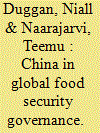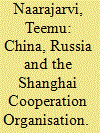| Srl | Item |
| 1 |
ID:
140489


|
|
|
|
|
| Summary/Abstract |
The Chinese public's domestic expectation is that its state will ensure a safe and affordable supply of food. However, in doing so, China has acquired large amounts of farmland abroad which has raised concerns among many developing countries. It has been argued that land grabbing in the developing world is a form of neo-colonialism. This role of a colonial power is in conflict with China's historical role, which presents China as a leader of the developing world. In order to bring these role expectations into conformity with each other, China has taken a more active role in global food security governance. It has brought food security to what is becoming the core of the global governance decision-making system, the G20. China's historical role, together with its growing economic power, has helped to push the G20 to understand the importance of food security. This has shifted the G20's understanding of economic global governance away from the traditional fields of banking and trade regulation toward understanding the developmental-oriented economic structure.
|
|
|
|
|
|
|
|
|
|
|
|
|
|
|
|
| 2 |
ID:
112866


|
|
|
|
|
| Publication |
2012.
|
| Summary/Abstract |
This paper discusses China and Russia and the Shanghai Cooperation Organisation Organisation (SCO), a Eurasian regional organisation established in 2001 and consisting of China, Russia and the four Central Asian republics of Kazakhstan, Kyrgyzstan, Tajikistan and Uzbekistan. I argue that while the two largest members of the SCO are essential to the organisation, they at the same time prevent the SCO from becoming a more comprehensive regional organisation. Moreover, the actions and presence of China and Russia in Central Asia, together with inherently inauspicious characteristics of the region when compared to the post-Cold War new regionalist thinking, hinder the overall regionalisation in the area. However, regionalisation, hopefully in time leading to greater regional cooperation in Central Asia, is very much in the interests of Europe and the European Union (EU) as a potential peaceful way forward in the development of the region.
|
|
|
|
|
|
|
|
|
|
|
|
|
|
|
|